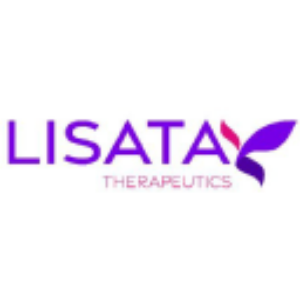Positive Preliminary Cohort B Results from the AGITG-led ASCEND Trial to be Presented at ESMO GI Evaluating Lisata’s Certepetide in Combination with Standard-of-Care Chemotherapy in Metastatic Pancreatic Cancer
Rhea-AI Summary
Lisata Therapeutics (NASDAQ:LSTA) announced positive preliminary results from Cohort B of the ASCEND Phase 2b trial evaluating certepetide in metastatic pancreatic cancer. The trial, conducted across 24 sites in Australia and New Zealand, demonstrated significant improvements in patient outcomes.
Key findings include progression-free survival of 60.8% vs 25% (certepetide vs placebo), median progression-free survival of 7.5 vs 4.7 months, and objective response rate of 45.2% vs 19%. Median overall survival improved to 10.32 months vs 9.23 months. The Cohort B regimen, which added a second dose of certepetide, showed meaningful improvements compared to Cohort A's single-dose approach.
Final data from both cohorts is expected later this year, with results suggesting certepetide could potentially transform treatment for metastatic pancreatic cancer, which currently has a five-year survival rate of just 13%.
Positive
- Significant improvement in 6-month progression-free survival (60.8% vs 25%) for certepetide group
- Higher objective response rate of 45.2% vs 19% in placebo group
- Improved median progression-free survival of 7.5 months vs 4.7 months
- Attractive safety profile demonstrated across both cohorts
- Two-dose regimen (Cohort B) showed better results than single-dose (Cohort A)
Negative
- Modest improvement in median overall survival (10.32 vs 9.23 months)
- Full study data still pending, creating uncertainty about final outcomes
News Market Reaction – LSTA
On the day this news was published, LSTA gained 16.67%, reflecting a significant positive market reaction.
Data tracked by StockTitan Argus on the day of publication.
ASCEND comprises two dosing regimens of certepetide evaluated in two separate study arms enrolled sequentially
Positive signal in progression-free survival and objective response rate observed in certepetide-treated group compared to placebo-treated group
Cohort B data corroborate Cohort A data indicating certepetide has a treatment effect and an attractive safety profile
Full study data from both cohorts expected later this year
BARCELONA, Spain, June 26, 2025 (GLOBE NEWSWIRE) -- The Australasian Gastro-Intestinal Trials Group (“AGITG”), the NHMRC Clinical Trials Centre at the University of Sydney, and Lisata Therapeutics, Inc (“Lisata”, Nasdaq: LSTA), today announced promising positive preliminary Cohort B data from the ASCEND Phase 2b trial (NCT05042128) in metastatic pancreatic cancer, with AGITG sponsoring the study and Lisata providing funding. Dr. Andrew Dean, Study Chair, is scheduled to present these findings at the European Society for Medical Oncology (“ESMO”) Gastrointestinal Cancers Congress in Barcelona, Spain, on 2 July, 2025.
The ASCEND trial is a 158-patient, double-blind, randomized, placebo-controlled Phase 2b clinical trial evaluating standard-of-care (“SoC”) gemcitabine and nab-paclitaxel vs SoC plus certepetide or placebo in patients with metastatic pancreatic ductal adenocarcinoma (“mPDAC”). Participants were enrolled from 24 sites across Australia and Aotearoa New Zealand from May 2022 to December 2023. The study comprises two sequentially enrolled dosing regimens of either certepetide or placebo in combination with SoC. Cohort A employed one 3.2 mg/kg dose of certepetide administered as an IV push over 1 minute immediately after the infusion of gemcitabine and before the infusion of nab-paclitaxel. Cohort B mimicked the dosing regimen of Cohort A; however, it employed an additional dose of certepetide or placebo administered 4 hours after the initial dose.
As announced in January of this year, preliminary Cohort A data was presented at the 2025 American Society of Clinical Oncology Gastrointestinal Cancers Symposium. Those data showed a positive trend in overall survival, including four complete responses in the certepetide-treated group compared to none in the placebo-treated group.
The preliminary data from Cohort B demonstrate a six-month progression-free survival (“6MPFS”) of
A comparison of data from Cohort A and Cohort B indicates that the addition of two doses of certepetide (Cohort B regimen) to SoC chemotherapy resulted in a clinically meaningful improvement in both PFS and ORR for patients with mPDAC. These clinically significant findings provide compelling support for the continued and expedited investigation of certepetide as a novel therapeutic agent for the treatment of metastatic pancreatic cancer.
Final data and key findings from both cohorts of the ASCEND study are anticipated to be available later this year, with more information to follow as it becomes available.
“We are pleased with the promising Cohort B data of the ASCEND trial. These data, taken with those previously reported for Cohort A, reinforce our confidence in the therapeutic promise of certepetide. Along with its attractive safety profile, we continue to believe that certepetide has the potential to transform the treatment landscape for mPDAC and many other devastating solid tumors”, stated David J. Mazzo, PhD, President and Chief Executive Officer of Lisata.
Pancreatic cancer has one of the poorest prognoses among cancers, ranking as the 6th leading cause of cancer mortality worldwide1. In Australia, pancreatic cancer is the 3rd leading cause of cancer-related deaths2. With a five-year survival rate of just
Dr. Dean commented, “The data from ASCEND provides us with critical new knowledge that will significantly enhance our understanding of how to optimally treat patients battling pancreatic cancer. We are excited by the evidence of certepetide’s therapeutic effect and encourage the continued development of this potentially treatment paradigm-changing compound.”
We thank the Gut Cancer Foundation for providing funding for trial sites in Aotearoa New Zealand.
1. Bray F, Laversanne M, Sung H, Ferlay J, Siegel RL, Soerjomataram I, et al. Global cancer statistics 2022: GLOBOCAN estimates of incidence and mortality worldwide for 36 cancers in 185 countries. CA Cancer J Clin. 2024;74(3):229–63.
2. Australian Institute of Health and Welfare (2024) Cancer data in Australia, AIHW, Australian Government, accessed 13 May 2025.
About Certepetide
Certepetide (formerly LSTA1), an internalizing RGD (arginylglycylaspartic acid or iRGD), cyclic peptide product candidate, is an investigational drug designed to activate a novel uptake pathway that allows co-administered or tethered anti-cancer drugs to target and penetrate solid tumors more effectively. Certepetide actuates this active transport system in a tumor-specific manner, resulting in systemically co-administered anti-cancer drugs more efficiently penetrating and accumulating in the tumor. Certepetide also has been shown to modify the tumor microenvironment resulting in tumors which are more susceptible to immunotherapies. We and our collaborators have amassed significant non-clinical data demonstrating enhanced delivery of a range of emerging anti-cancer therapies, including immunotherapies and RNA-based therapeutics. To date, certepetide has also demonstrated favorable safety, tolerability, and clinical activity in completed and ongoing clinical trials designed to test its ability to enhance the effectiveness of standard-of-care chemotherapy for pancreatic cancer. Lisata is exploring the potential of certepetide to enable a variety of treatment modalities to treat a range of solid tumors more effectively. Certepetide has been awarded Fast Track designation (U.S.) and Orphan Drug Designation for pancreatic cancer (U.S. and E.U.) as well as Orphan Drug Designation for glioma (U.S.) and osteosarcoma (U.S.). Additionally, certepetide has received Rare Pediatric Disease Designation for osteosarcoma (U.S.).
About Lisata Therapeutics
Lisata Therapeutics is a clinical-stage pharmaceutical company dedicated to the discovery, development and commercialization of innovative therapies for the treatment of advanced solid tumors and other major diseases. Lisata’s cyclic peptide product candidate, certepetide, is an investigational drug designed to activate a novel uptake pathway that allows co-administered or tethered anti-cancer drugs to selectively target and penetrate solid tumors more effectively. Lisata has already established noteworthy commercial and R&D partnerships based on its CendR Platform® technology. The Company expects to announce numerous milestones over the next 1.5 years and believes that its projected capital will fund operations into the fourth quarter of 2026, encompassing anticipated data milestones from its ongoing and planned clinical trials. For a comprehensive overview of certepetide's mechanism of action, please view our informative short film. For more information on the Company, please visit www.lisata.com.
About the Australasian Gastro-Intestinal Trials Group (AGITG)
The AGITG is a multi-disciplinary collaborative group that undertakes patient-centric research to advance medical care and practice in the treatment of gastro-intestinal cancer. Since 1991, the AGITG has led 90 GI cancer research studies, enrolling 9,900 patients across 287 sites worldwide. Learn more.
About the NHMRC Clinical Trials Centre, University of Sydney
The NHMRC Clinical Trials Centre is a flagship research centre at the University of Sydney that designs and coordinates clinical trials. This includes responsibility for study coordination, monitoring, data acquisition and management and statistical analysis. Over the past 35 years the NHMRC Clinical Trials Centre has co-led more than 150 clinicals trials involving over 100,000 patients which have changed global clinical practice. It also undertakes work in health economics, biostatistics, systematic reviews and biomarker research that can help inform healthcare providers about best practice. Learn more.
Forward-Looking Statements (Lisata related)
This communication contains “forward-looking statements” that involve substantial risks and uncertainties for purposes of the safe harbor provided by the Private Securities Litigation Reform Act of 1995. All statements, other than statements of historical facts, included in this communication regarding the Company’s clinical development programs are forward-looking statements. In addition, when or if used in this communication, the words “may,” “could,” “should,” “anticipate,” “believe,” “estimate,” “expect,” “intend,” “plan,” “predict” and similar expressions and their variants, as they relate to Lisata or its management, may identify forward-looking statements. Examples of forward-looking statements include, but are not limited to, the potential efficacy of certepetide as a treatment for patients with solid tumors; our beliefs about the potential uses and benefits of certepetide; statements relating to Lisata’s continued listing on the Nasdaq Capital Market; expectations regarding the capitalization, resources and ownership structure of Lisata; the approach Lisata is taking to discover and develop novel therapeutics; the adequacy of Lisata’s capital to support its future operations and its ability to successfully initiate and complete clinical trials; and the difficulty in predicting the time and cost of development of Lisata’s product candidates. Actual results could differ materially from those contained in any forward-looking statement as a result of various factors, including, without limitation: results observed from preliminary data are not necessarily indicative of final results and one or more of the clinical outcomes may materially change following more comprehensive reviews of the data and as more patient data becomes available, including the risk that unconfirmed responses may not ultimately result in confirmed responses to treatment after follow-up evaluations; the risk that product candidates that appeared promising in early research and clinical trials do not demonstrate safety and/or efficacy in larger-scale or later clinical trials; the safety and efficacy of Lisata’s product candidates, decisions of regulatory authorities and the timing thereof, the duration and impact of regulatory delays in Lisata’s clinical programs, Lisata’s ability to finance its operations, the likelihood and timing of the receipt of future milestone and licensing fees, the future success of Lisata’s scientific studies, Lisata’s ability to successfully develop and commercialize drug candidates, the timing for starting and completing clinical trials, rapid technological change in Lisata’s markets, the ability of Lisata to protect its intellectual property rights; and legislative, regulatory, political and economic developments. The foregoing review of important factors that could cause actual events to differ from expectations should not be construed as exhaustive and should be read in conjunction with statements that are included herein and elsewhere, including the risk factors included in Lisata’s Annual Report on Form 10-K filed with the SEC on February 27, 2025, and in other documents filed by Lisata with the Securities and Exchange Commission. Except as required by applicable law, Lisata undertakes no obligation to revise or update any forward-looking statement, or to make any other forward-looking statements, whether as a result of new information, future events, or otherwise.
Contact:
Lisata Therapeutics (Investors):
John Menditto
Vice President, Investor Relations and Corporate Communications
Email: jmenditto@lisata.com
Phone: 908-842-0084
Lisata Therapeutics (Media):
ICR Healthcare
Elizabeth Coleman
Account Supervisor
Phone: 203-682-4783
Email: elizabeth.coleman@icrhealthcare.com
AGITG
Erin Burgess, Head of Communications
Email: erin@gicancer.org.au
Mobile: 0402 152 592
NHMRC CTC, University of Sydney
University of Sydney Media Office
Email: media.office@sydney.edu.au
This press release was published by a CLEAR® Verified individual.








